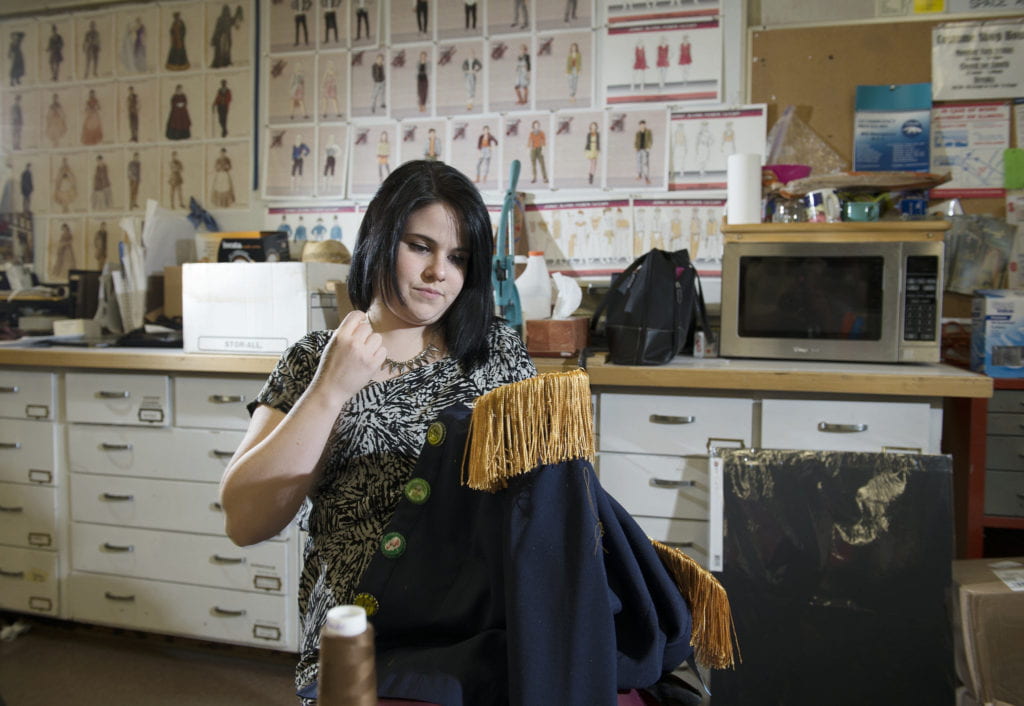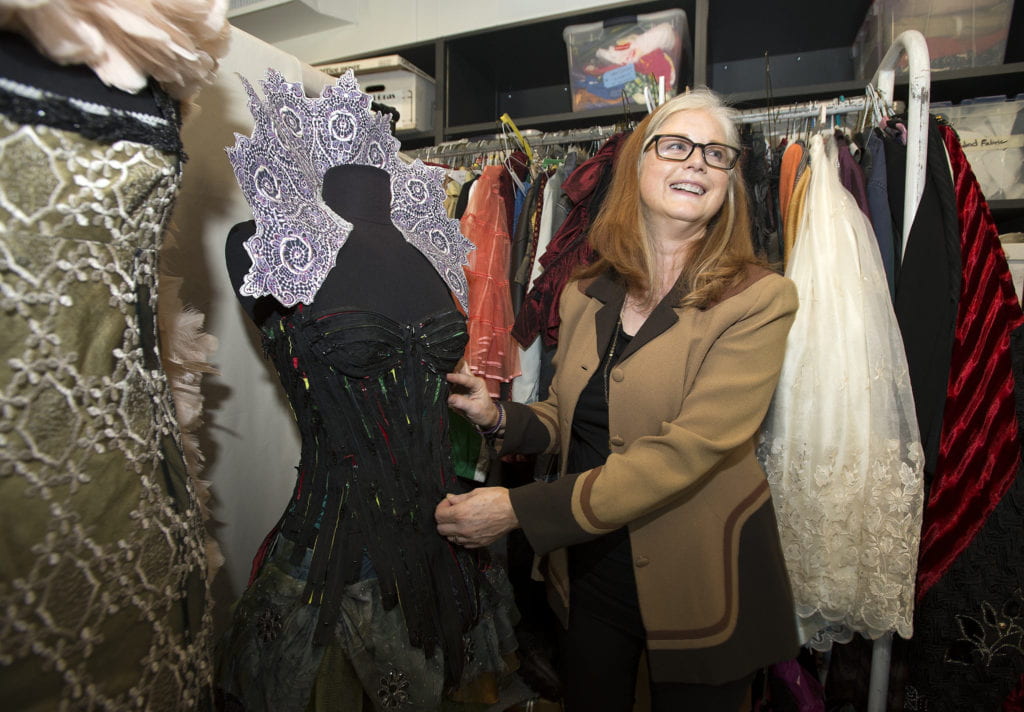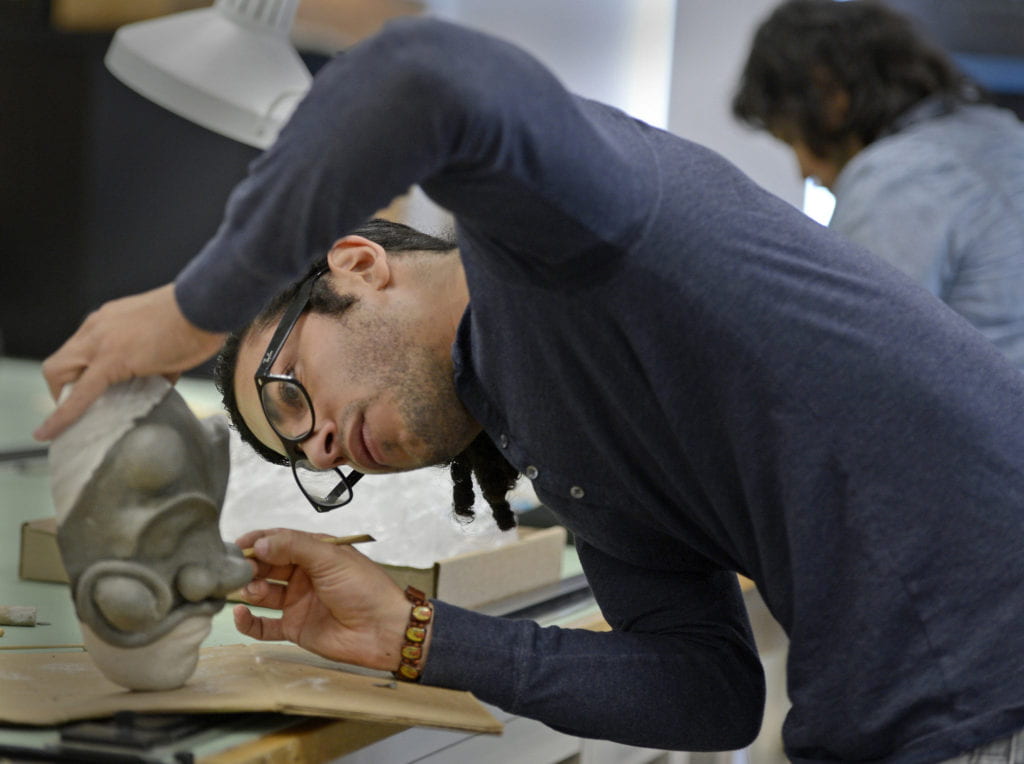Dressing the part
Graduate students in UCI’s costume design program draw their own patterns for success
The costume workshop buzzed with excitement. Just days away from the first dress rehearsal of the fall production of “Bloody, Bloody Andrew Jackson,” designer Kaitlyn Kaufman and the technicians were finishing up the odds and ends of her eclectic do-it-yourself ensembles.
“It’s sort of like Occupy Wall Street meets improvisation,” Kaufman said of the attire. “The redcoats wear hoodies, and we use bottle-cap buttons. It’s really fun.”
The UC Irvine shop looked like something out of the hit reality competition show “Project Runway.” Sketches of visionary designs lined the walls, unfinished dresses held together by pins and needles hung on mannequin bodies, and whimsical embellishments were being sewn onto jackets. Everyone was hard at work, focusing on their task to meet deadline.
For 26-year-old graduate student Kaufman, “Bloody, Bloody” was more than just a musical that turns a former U.S. president into a rock star. It’s her thesis.
Every year, UC Irvine design faculty members review hundreds of portfolios submitted by aspiring designers, but only two students are offered spots in the M.F.A. program annually, bringing the total to six in residence at any given time.
Training includes industry trends and technological tools used in the creative process, as well as business aspects such as pitching an idea and negotiating a contract.
Holly Poe Durbin, an experienced professional costume artist and head of costume design at UC Irvine, said that the program’s small size is a major selling point for students seeking mentorship. And in an industry saturated with actors, costume design remains an active, employable niche, she noted.
“There are so few students interested in costuming compared to acting,” Durbin said. “I actually get to have one-on-one mentoring relationships with all of my students.”
UC Irvine students can enroll in costume design courses in two ways: as M.F.A. students specializing in the field or as undergraduate honor students majoring in drama.
Classes range from theoretical courses on design principles to construction technique workshops. Students use digital media to render their artistic designs and even learn how to print their own custom fabric.
The goal is to train well-versed, multifaceted designers prepared to work in costuming in any subset of the entertainment industry. But the program calls for more than just artistic aptitude and the ability to create pieces of clothing and accessories.
“You can have all the skills in the world, but if you can’t tell the story, then you have missed the whole point of the education,” Durbin said. “There really is a framework that has to guide your choices intelligently.”
Lecturer Shigeru Yaji, who specializes in costume crafting techniques such as hat and mask making, said he tries to help his students find their artistic voice. This, he said, makes them mature artists and more employable in the long run. In his mask making class, for example, he challenges students to consider how the costume affects an actor’s ability to perform.
“While they’re here, I want them to find their strengths and weaknesses and find out what kind of designer they are or want to become,” said Yaji, a professional costume designer with more than 30 years of experience. “We can’t give them everything. They have to do it themselves. But we can help them reach their goal.”
UC Irvine costume design students are given a chance to learn every aspect of costuming, from conception to creation to implementation, Durbin said.
Students learn how to lead a team of technicians in a costume shop, work with directors to determine thematic vision, and problem-solve with actors to produce costumes that best serve performance needs.
Throughout their residence in the program, graduate students are required to work on at least three UC Irvine productions, and many take on additional projects through internships at local theater companies such as South Coast Repertory.
Kaufman estimates that she works more than 60 hours a week on costume-related projects and class assignments, but it’s a labor of love, and she’s happy to do it. Her pride and joy is a custom tailcoat that features silk-screened text from the preamble to the U.S. Constitution.
“I’ve really grown in this program,” she said. “It’s been a great fit for me because it’s a lot more collaboration than other programs I interviewed with. They don’t try to force you into a particular style. We get to stick to our own aesthetic and improve on that.”
While costumers might have more work opportunities than actors in the entertainment industry, it’s still a competitive field, Durbin noted.
“Costumers are unique because we’re part of building the character with the actor and director,” she said. “As long as there are living, breathing actors, we’re going to have old-fashioned concerns about clothing the body and creating a character. There’s no getting around that.”
Students who complete the M.F.A. program at UC Irvine tend to pursue three career routes: professional designing, technical creation and education.
But to make the cut in the industry, designers must know how to pitch an idea and navigate job contracts, Durbin said. Budgets are often tight, and without enough resources, a designer can end up in grueling work conditions.
“We have to be fairly astute at business so we can negotiate the scope of a job,” she said. “Then we have to throw away the business hat for a while and delve into the script and characters to figure out the art themes we want to work with. It requires a lot of research.”
Many of UC Irvine’s costume design graduates have designed for film and television, theme park productions, and national and regional theaters such as the Oregon Shakespeare Festival.
For several years, UC Irvine alumnus Joe Kucharski worked as a wardrobe coordinator for Disneyland, designing clothing for small-scale parades. He also managed character costume development for the animated film “How to Train Your Dragon.”
Today, Kucharski teaches costume design at Ohio’s Cedarville University and maintains a blog about industry issues – the impact of changing technology, for example.
“UC Irvine really helped me to hone my skills as a visual artist,” he said. “I felt like I left the program with a really rich understanding of costume design across many different fields and genres.”
Kucharski said that while other schools are behind in terms of teaching technological skills necessary for modern costume design – including the use of Adobe Photoshop to create digital renderings and the use of textile printing machines – UC Irvine trained him to be tech-savvy in a demanding field.
“Studios want fully illustrated, fully Photoshopped and realistic renderings,” he said. “That alone is something that UC Irvine has an edge on. Digital fabric technology and printing has also really taken over the industry. The students and professionals who are going to fare well are those who adopt technology. We’re not in a position to fight it. We need it.
“Being able to understand the human form and the traditional side of art totally makes you better in the technology side of art. It’s really about appreciating traditional style while looking to the future.”
Editor’s note: Two upcoming drama productions at UC Irvine will feature costumes by graduate students.
- “Angels in America,” with costumes designed by second-year M.F.A. student Leanna Moore, will be staged in the Robert Cohen Theatre at 8 p.m. Saturday, Jan. 25; 2 and 7:30 p.m. Sunday, Jan. 26; 8 p.m. Thursday, Jan. 30; 8 p.m. Friday, Jan. 31; 2 and 8 p.m. Saturday, Feb. 1; and 2 p.m. Sunday, Feb. 2.
- “The Trial of Dedan Kimathi,” with costumes designed by first-year M.F.A. student Jojo Siu, was written by Ngũgĩ wa Thiong′o, Distinguished Professor of comparative literature, in collaboration with Micere Githae Mugo. Performances will take place in the Experimental Media Performance Lab (xMPL) at 8 p.m. Saturday, March 8; 2 and 7:30 p.m. Sunday, March 9; 7:30 p.m. Tuesday, March 11; 7:30 p.m. Wednesday, March 12; 8 p.m. Thursday, March 13; 8 p.m. Friday, March 14; 2 and 8 p.m. Saturday, March 15; and 2 p.m. Sunday, March 16.
For ticket information, call 949-824-2787. Tickets also may be purchased online.




